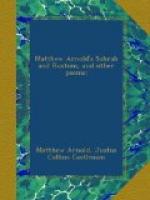=232. As some grave Tyrian trader, etc=. Tyre, the second oldest and most important city of Phoenicia, was, in ancient times, a strong competitor for the commercial supremacy of the Mediterranean.
=236. AEgean Isles=. The AEgean Sea, that part of the Mediterranean lying between Greece on the west, European Turkey on the north, and Asia Minor on the east, is dotted with numerous small islands, many of which are famous in Greek mythology.
=238. Chian wine=. Chios, or Scio, an island in the AEgean Sea (see note above), was formerly celebrated for its wine and figs.
=239. tunnies=. A fish belonging to the mackerel family; found in the Mediterranean Sea.
=244. Midland waters=. The Mediterranean Sea.
=245. Syrtes=. The ancient name of Gulf of Sidra, off North Africa, the chief arm of the Mediterranean on the south, =soft Sicily=. Sicily is noted for its delightful climate; hence the term, “soft Sicily.”
=247. western straits=. Strait of Gibraltar.
=250. Iberians=. Inhabitants of the Iberian Peninsula, formed by Portugal and Spain.
What atmosphere is given the poem by the first stanza? What quest is to be begun, l. 10? What caused the “Scholar” to join himself to the gipsies? What were his original intentions? Why, then, did he continue with them till his death? Why would he avoid others than members of the gipsy crew? Why his pensive air? To what truth does the author suddenly awake? How does the Scholar-Gipsy yet live to him? Explain fully lines 180-200. Note carefully the author’s contrast between the life led by the Scholar-Gipsy and our modern life. Which is better? Why? Make an application of the figure of the Tyrian trader. Is it apt? Why used by the poet? Discuss the verse form used. Is it adapted to the theme of the poem? [203]
THYRSIS
A monody to commemorate the author’s friend, Arthur Hugh Clough, who died at Florence, 1861.
Throughout this poem there is reference to the preceding selection, The Scholar-Gipsy, of which it is the companion piece, and, in a sense, the sequel. It is one of the four great elegies in the English language.
Thyrsis is a name common to both ancient and modern literature. In the Idyls of Theocritus it is used as the name of a herdsman; in the Eclogues of Vergil, of a shepherd; while in later writings it has come to mean any rustic.
Arthur Hugh Clough (1819-1861), whose poetry is closely akin in spirit to Arnold’s, was a young man of genius and promise. He studied at both Rugby and Oxford, where he and Arnold were intimately associated and became fast friends. In 1869 his health began to fail, and two years later he died in Florence, Italy, where he had gone in the hope of being benefited by the climate.




